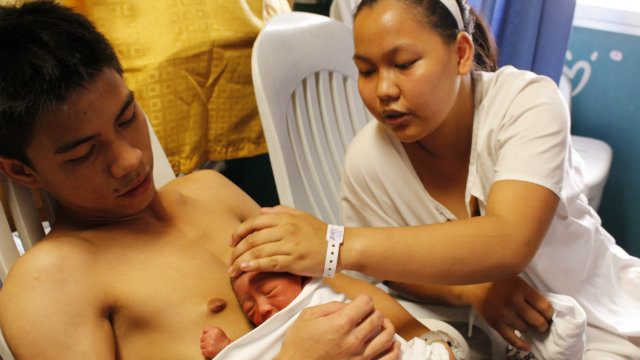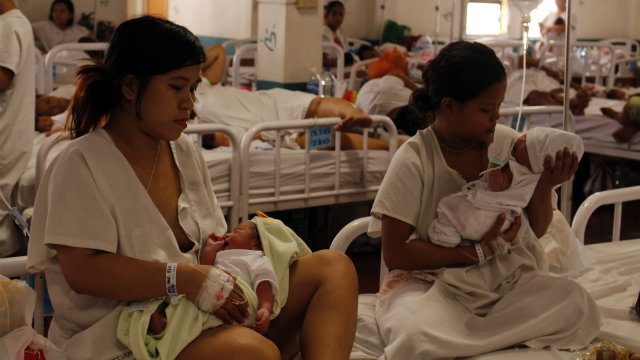SUMMARY
This is AI generated summarization, which may have errors. For context, always refer to the full article.

MANILA, Philippines – Only his small face is visible. As with most newborns, his eyes are still snapped shut, and his face is scrunched up and wrinkly in appearance. His head is wrapped in a white bonnet and his tiny body is strapped to his father’s chest, binding him close with the use of a tube cloth.
For a minute, the baby twists and turns and his father, Mark Anthony and his mother, Rosanna Jane, fuss over him and try to soothe him. Mark Anthony strokes his head and Rosanna Jane gently pats his back.
Raikko Padilla was born at the Jose Fabella Hospital in the last week of February 2015, underweight and premature.
Doctors recommended swaddling Raikko in a tight first embrace so he would benefit from the natural warmth of his mother’s body and enjoy the feeling of security from the skin-to-skin contact. This simple act of continuous body contact between mother and newborn has been proven to promote steady weight gain and bonding, effectively reducing the incidence of newborn death. (READ: PH’s ‘Unang Yakap’ can save babies in Western Pacific)
Skin-to-skin contact between the father and the newborn is equally important.
“The doctor told us that Raikko should be wrapped 24 hours a day while we wait for his weight to go up. So my wife and I alternate carrying him,” explained Mark Anthony, rather sheepishly.
Maternal and neonatal death rates are high in the Asia Pacific region, where an estimated 54% of children who die before their 5th birthday were newborns.
“The Philippines is one of the countries in the Asia Pacific region with the highest rate of newborn death,” said Dr Howard Sobel, World Health Organization (WHO) coordinator for Reproductive, Maternal, Newborn, Child and Adolescent Health.
According to WHO data, the Philippines is second only to China in terms of neonatal death and mortality. The other countries in the AP with a high neonatal death rate are Vietnam, Cambodia, Papua New Guinea, Solomon Islands, and Lao People’s Democratic Republic.
The increase of teenage pregnancy contributes to the problem. From 2000 to 2010, the United Nations Population Fund (UNFPA) noted a 65% increase in teen pregnancies.
Common causes of newborn death include prematurity (being born too soon), low birth weight, and severe infection.
Teens, because their bodies and reproductive health functions have not fully developed, are not physically equipped to take on the physical demands of pregnancy. They are extremely vulnerable to high risk pregnancies.
First embrace (also known as kangaroo mother care because it mimics the way a mother kangaroo carries her baby in her pouch) addresses the most common causes of newborn death and disease through a package of actions and interventions called early essential newborn care (EENC).
Breast is best always
The EENC campaign, which is a bundle of simple and cost-effective measures such as first contact at birth, rooming-in, and exclusive breastfeeding, is estimated to save more than 50,000 newborn lives and prevent hundreds of thousands of complications each year.

Babies born in the Fabella Hospital are immediately placed on their mothers’ chest and breastfed. Early initiation of breastfeeding is especially important because colostrum – the first milk – contains essential nutrients, antibodies, and immune cells.
“Colostrum acts like the baby’s first immunization,” explained Sobel.
Fabella has an exclusive breastfeeding policy and has initiated measures to help mothers build their confidence to breastfeed and maintain a steady milk supply.
In the maternity ward, beds are stuck together and placed side by side. These “tandem beds” have come to be known as a trademark appearance of the hospital back from the days it was dubbed a “baby factory” where 100 babies a day were delivered (To break down the math, that’s about 4 babies every hour or one baby every 15 minutes) and as many as 4 mothers had to share one bed, lying on it horizontally to maximize space.
Since 2009, when other hospitals and lying-in clinics began to open in the area, the number of daily deliveries consistently began to dwindle.
Currently, the hospital delivers about 50 to 60 babies a day.
“We still use the tandem bed arrangement as a breastfeeding support mechanism. In case one mother has problems expressing milk, the other mothers in the tandem bed may act as a temporary wet nurse and help augment her milk supply,” said Dr Maria Cynthia Tan, head of professional training and research service at the Jose Fabella Memorial Hospital.
Tan adds that it is also for practical reasons. Since there are no bassinets in the hospitals, the babies sleep in between the mothers to protect them from falling off the bed.
Milk bank
As one of the 4 milk banks in the country, Fabella Hospital accepts donations of expressed breastmilk from both walk-in donors and their patients.
These donations are pasteurized and then kept frozen so they can be distributed to mothers who cannot breastfeed their own babies for various reasons like medical conditions. About 10% of the donated breastmilk is set aside for allocation to disaster survivors whose milk supply may be disrupted due to stress and grief. (Read Inside Fabella Hospitals’ Milk Bank here.)
Mothers who donate breastmilk are enrolled in a loyalty program which entitles them to get free medical services such as pre-natal visits.
“We discourage cash incentives for milk donations. We want to avoid the possibility of mothers prioritizing the donation of their milk for cash and neglecting the milk supply her own baby needs,” said Dr Melissa Juco, a neonatal medicine specialist.
“This hospital is the bastion of breasfeeding in the Philippines,” according to Dr Rueben Flores, Medical Center Chief of the Jose Fabella Memorial Hospital.
Flores added that the hospital will continue to focus on promoting programs like First Embrace and exclusive breastfeeding which are simple, cost-efficient and effective, and appropriate for countries with limited resources like the Philippines. – Rappler.com
For more information about the Fabella Hospital Human Milk Bank, please call 734-5561 to 65 local 156. The Human Milk Bank is open Monday – Friday, 8am to 5pm. A processing fee of P220/100ml of breastmilk is levied on those who wish to procure breastmilk from the Fabella Hospital Human Milk Bank.
Add a comment
How does this make you feel?
There are no comments yet. Add your comment to start the conversation.